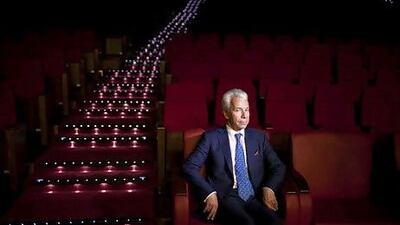Historic photos hung in the halls of the Universite Paris-Sorbonne Abu Dhabi to illustrate just how developed the capital's network of ports, roads and airports have become over the past 40 years.
Abu Dhabi Model Economies: More on the 2030 vision
A vision of Abu Dhabi's 2030 future in focus A special series in The National examines the Abu Dhabi Economic Vision 2030 plan, and the four model economies that the capital has used to benchmark its success upon. Read article
Abu Dhabi's vision of the future is well on the road to reality Entrepreneurism, education, innovation and diversification lie at the root of the capital's Economic Vision 2030. Read article
Capital's overseas inspiration is brought out closer to home The National's special series on the Abu Dhabi Economic Vision 2030 examines the tourism industry within the capital. Read article
The plan with broad appeal for Abu Dhabi The National's special series on the Abu Dhabi Economic Vision 2030 examines how the capital is trying to grow the number of small and medium-sized firms here. Read article
But while Abu Dhabi has certainly become better connected to trading partners around the world through newly developed infrastructure, it still has a way to go before it can cut its reliance on oil to its target of 36 per cent of GDP by 2030.
Last week, Statistics Centre Abu Dhabi reported the oil sector still accounted for 49.7 per cent of the capital's GDP last year, up slightly from 49 per cent the year before.
To help accomplish the Government's goal as outlined in its 2030 vision, the Abu Dhabi Department of Economic Development has recently been attending international trade shows in places such as China, South Korea and Germany to promote the capital while boosting trade and investment from different countries.
About a dozen partners have joined the organisation, including the Abu Dhabi Council for Economic Development, the local chamber of commerce and a handful of private companies in various sectors.
Meanwhile, the emirate's free zones have also stimulated trade and investment from foreign companies. The Khalifa Industrial Zone Abu Dhabi, which is already home to Emirates Aluminium, is planned to occupy an area two-thirds the size of Singapore and fully open by the end of next year. Combined, this and other efforts drew some Dh86.6 billion (US$23.57bn) worth of commodity imports to the capital last year, predominantly in the form of machinery and transport equipment.
The Government has also been fostering unique tie-ups between different organisations to boost the flow of services, as well as knowledge in sectors such as education and the arts. The Universite Paris-Sorbonne Abu Dhabi has created graduate degrees in fields highlighted within the Economic Vision, including urban planning and tourism.
The school custom-built a master's degree in art history and museum studies linked to Saadiyat Island, due to be home to the Louvre Abu Dhabi.
"… Because the 2030 vision is that of a post-oil society and knowledge-based economy, what you need first is to have educated people and world-class education," says Dr Jean-Yves de Cara, the executive director of Universite Paris-Sorbonne Abu Dhabi.
* Neil Parmar

